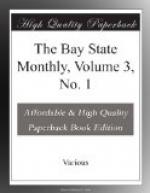“Ho passenger ’tis worth your paines to stay & take a dead man’s lesson by ye way. I was what now thou art & thou shall be What I am now what odds twixt me and thee Now go thy way but stay take one word more Thy staff for ought thou knowest stands next ye door Death is ye dore yea dore of heaven or hell Be warned, Be armed, Believe, Repent, Fairewell.”
The virtues of one who was “downright for business, one of cheerful spirit and entire for the country” are recorded in this fashion:
“Here lyes ovr Captaine, & Major
of Suffolk was withall:
A Goodley Magistrate was he, and Major
Generall,
Two Troops of Hors with him here came,
svch worth his loue did crave;
Ten Companyes of Foot also movrning marcht
to his grave.
Let all that Read be sure to Keep the
Faith as he has don.
With Christ his liues now, crowned, his
name was Hvmfrey Atherton.”
The following was written on the death of John Foster, who is mentioned in the old annals as a “mathematician and printer”:
“Thy body which no activeness did
lack,
Now’s laid aside like an old Almanack;
But for the present only’s out of
date,
’Twill have at length a far more
active state.
Yes, tho’ with dust thy body soiled
be.
Yet at the resurrection we shall see
A fair EDITION, and of matchless worth.
Free from ERRATAS, new in Heaven set forth.
’Tis but a word from God the great
Creator,
It shall be done when he saith Imprimator.”
The clerk of the old Dorchester Church seems also to have been a maker of elegiac verse; for after the decease of Rev. Richard Mather, the pastor, and one of the ablest divines of colonial New England, the church records contain the two complimentary stanzas quoted below, the first being an evident attempt at anagram:
“Third in New England’s Dorchester,
Was this ordained minister.
Second to none for faithfulness,
Abilities and usefulness.
Divine his charms, years seven times seven,
Wise to win souls from earth to heaven.
Prophet’s reward his gains above,
But great’s our loss by his remove.”
Sacred to God his servant Richard Mather,
Sons like him, good and great, did call
him father.
Hard to discern a difference in degree,
’Twixt his bright learning and his
piety.
Short time his sleeping dust lies covered
down,
So can’t his soul or his deserved
renown.
From ’s birth six lustres and a
jubilee
To his repose: but labored hard in
thee,
O, Dorchester! four more than thirty years
His sacred dust with thee thine honour
rears.”
This couplet to three brothers named Clarke must suffice for epitaphs:
“Here lie three Clarkes, their accounts
are even,
Entered on earth, carried up to Heaven.”
Before taking leave of these fascinating old records, so rich in facts and the stuff that fiction is made of, it will be interesting to have an estimate of the growth of the Dorchester Plantation; for this purpose the valuation of the town is given, a century from the date of its settlement:




